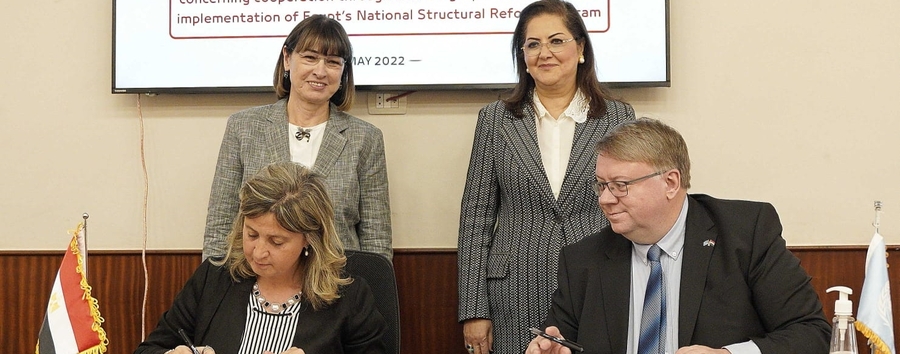The Ministry of Planning and Economic Development and the United Nations in Egypt signed a Declaration of Intent to strengthen the implementation of Egypt’s National Structural Reform Programme 2021 – 2024

13 May 2022
H.E. Dr. Hala El-Said, Egypt's Minister of Planning and Economic Development, and Ms. Elena Panova, UN Resident Coordinator in Egypt witnessed on Thursday the signing ceremony of a strategic partnership to support the implementation of the Egyptian National Program for Structural Reform 2021-2024.
El-Said said that the declaration works to enhance participation in the implementation of the 2030 Agenda for Sustainable Development through a strategic partnership in implementing the National Structural Reform Agenda for Egypt 2021-2024, which was launched last April.
El-Said added that the global economy has just begun to recover from the Corona pandemic, but economic activity around the world has been negatively affected by the global geopolitical repercussions.
El-Said referred to the high rate of inflation due to the rise in the prices of food commodities, which will have wide effects on plans to achieve sustainable recovery.
El-Said added that recognizing the critical importance of partnerships with international organizations, the private sector, civil society, think tanks, and academia to promote the achievement of the sustainable development agenda, the signing of the agreement contributes to the establishment of an important partnership between the United Nations and the Egyptian government.
El-Said indicated that the Egyptian government launched a 3-year national structural reform program.
The program aims to diversify the production of the Egyptian economy by focusing on three leading sectors, including manufacturing, agriculture, and communications and information technology, which represent the main pillar of the structural reform program.
El-Said added that the program also includes a comprehensive basic pillar related to raising the efficiency of labor market flexibility, developing technical education and the vocational training system in partnership mainly with the private sector, and implementing the labor-management information system for the first time.
El-Said noted that during the implementation of the National Structural Reform Program, work is also being done to develop specific areas in cooperation with the United Nations Resident Coordinator in Egypt, including forecasting the potential impacts of reforms on the selected sustainable development goals, in addition to reviewing specific policy measures and quantitative goals specified in the National Structural Reform Program With a focus on inclusion and sustainability.Emphasis is also placed on identifying UN technical assistance and capacity development support to accelerate the implementation of the National Structural Reform Program, as well as facilitating effective multi-stakeholder partnership, and raising awareness, according to El-Said
“The UN family is proud to partner with the Government of Egypt to address critical structural reforms that will support sustainable development and help ensure that no one is left behind,” Ms. Elena Panova said.
She added that UN engagement with the government will advance the reform program through evidence-based monitoring and forecasting of policy impacts to help Egypt recover further from the COVID-19 pandemic, mitigate the effects of the current geopolitical crisis, and accelerate progress toward the Sustainable Development Goals.
For her part, Dr. Nada Masoud, Economic Adviser to the Minister of Planning and Economic Development, reviewed the economic reform program adopted by Egypt and the second phase of it represented in the structural reform program.
The structural reform program focuses on the real economy aspect and is consistent with Egypt's Vision 2030 and the 17 UN goals, and takes into account what is related to the green economy, environmental protection, and food security. Masoud also touched on the partners in achieving the program as well as its main pillars.
It is noteworthy that the partnership agreement that was signed, which is consistent with the United Nations Development Framework for Partnership (2018-2022), reflects the interest of the two parties to work together to continue the implementation of the economic reform program in Egypt that was launched in April 2021, and the comprehensive package of reforms aims to diversify the productive structure of the Egyptian economy, especially in the three leading sectors of manufacturing, agriculture, communications, and information technology.The partnership between the government and the United Nations in Egypt aims to accelerate progress toward the Sustainable Development Goals by maximizing the benefits of reform measures.The partnership agreement includes joint implementation of interventions in six areas to help advance economic reforms and ensure positive impacts across the SDGs and on the lives of the most vulnerable, including forecasting the potential impacts of reforms on various sustainable development goals such as poverty reduction and job creation.According to the partnership, the Ministry of Planning and Economic Development and the United Nations will review specific policy measures and quantitative targets set in the National Structural Reform Program to ensure the integration of specific considerations and needs of all regions and social groups, with a particular focus on youth, women and the most vulnerable groups, as well as the establishment of a high-frequency monitoring system on Impact of reforms, while facilitating effective partnership among multiple stakeholders to support implementation and raise awareness of reforms.
The agreement also requires the Ministry of Planning and Economic Development and the United Nations to identify areas in which technical assistance and capacity development can be provided by the United Nations on the fast track to implementation.









